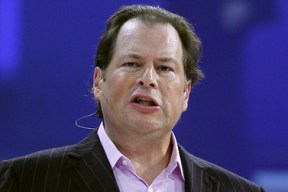Today, at the Web 2.0 Summit in San Francisco, Salesforce CEO Marc Benioff took the stage to talk about the current landscape of the cloud for the first time since the public back-and-forth between himself and Oracle CEO Larry Ellison. For those unfamiliar, earlier this month, Ellison cancelled Benioff’s keynote talk at The Oracle OpenWorld Conference. Benioff wasn’t particularly psyched about the move, and gave a fiery talk from the St. Regis Hotel across the street instead.
Benioff took a few shots at Oracle during his talk, telling listeners to “beware of the false cloud. It is not efficient, it is not democratic, it is not open”. Obviously, you can guess who was the proponent of this “false cloud”. It rhymes with Boracle.
Naturally, Ellison wasn’t going to take that sitting down, and fired back at Benioff, calling Salesforce “the roach motel of cloud services”. Ouch.
Interestingly, when Tim O’Reilly (who interviewed Benioff onstage today) played a little word association with Benioff and mentioned the name “Oracle”, the Salesforce CEO had nothing negative to say; instead, he said that Oracle was a great company and had a “great strategy”.
While Benioff’s tone has definitely tempered somewhat since OpenWorld in relation to Ellison and Oracle, it has not changed in terms of what the CEO sees as the future of his company and the future of the enterprise industry as a whole. Enterprise has to be, needs to be: Social.
What do I mean by that? Well, unsurprising for anyone who is familiar with Salesforce, Benioff has a big old man crush on Facebook.
“I really think that Facebook is becoming a vision of what the consumer operating system is”, he said. “Everything I want, I’m beginning to see on Facebook”.
The CEO was speaking largely in relation to Spotify, which he says has become his favorite music service, a quicker transition than he’s made to any other platform in the recent future. Having the Facebook UI built into Spotify is incredible, he said, allowing friends and colleagues to what he’s listening to in realtime — was inspiring to him.
“I’d like to be doing as many amazing things as Facebook is”, Benioff said, continuing on to say that Facebook is essentially driving the direction in which the entire industry is going, especially that of enterprise, which Benioff has been selling for some time now. Case in point: Here is a guest post from March 2010, in which Benioff argued that enterprise software should be more like … you guessed it … Facebook.
Benioff is quick to say that the social revolution is coming to enterprise software, that it is inevitable, and that those who don’t get on board are going to fall by the wayside. It is of utmost importance for enterprises (and let’s be honest, every company out there) to listen to their customers. And, as Benioff perceptively surmised, their customers — across the board — are on social networks, which is exactly where they should be interacting with them.
Again, the Salesforce CEO referenced the Arab Spring movement in the Middle East, in which Facebook and Twitter played such an integral role in allowing protestors (and one in all) to communicate with the outside world — and each other.
After these social networks enabled this kind of imperative and essential communication, signs like “Thank you, Facebook” were to be seen across the Middle East. As Benioff sarcastically pointed out today, “We didn’t see signs that said, ‘Thank you, Microsoft,'” Benioff said.
Benioff and O’Reilly both agreed that the cloud, mobility, and the shift to social have been fundamentally changing the Web, and that the same can be said for enterprise as well. In terms of social, Benioff said that the affects of the social media revolution have allowed people to interact and converse with brands and companies in realtime — at a pace unprecedented when looking back as little as five years ago. Thus, it is imperative for enterprise companies to be aware of brand impression, brand share, what people are saying about their company in realtime — because it can have a profound affect on your bottom line.
The most recent example? Netflix. Benioff said that the on-demand video network had a “pristine brand”, but when they made the loud price change to their customers’ accounts, splitting DVD and streaming, 27,000 negative comments popped up on their blog post, and Netflix’s market cap declined precipitously.
“There’s a pretty big connection there”, Benioff said. Enterprise needs to be more aware of what their customers are saying, and the key is tapping into social networks, because that’s where they are.
Thanks to Reuters for the Excerpt image
